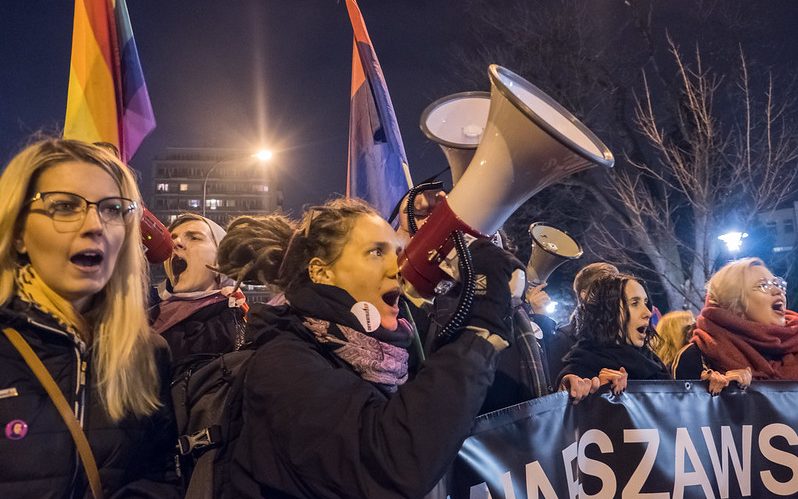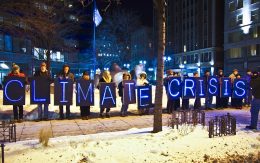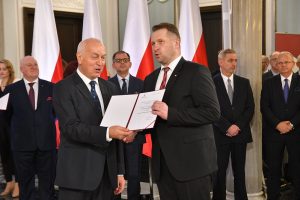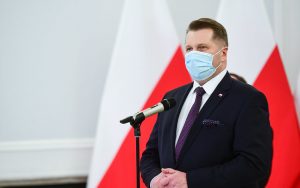Amidst a still raging pandemic, economically desperate and unsupported business-owners opening their businesses despite restrictions (Olejarczyk, 2021), education under attack, funding cuts and other painful reforms or ideas, the Polish government decided to do the one thing that the society needs the most: publish the decision made by the Constitutional Tribunal in October 2020, which makes abortions in the instance of severe and irreversible impairment of the fetus illegal on the grounds that, to do so is an act against the rules of the Polish Constitution (TVN24, 2021).
Unsurprisingly, people are on the streets again. Yet, this time in an instance of such an agglomeration of oppressive and uncooperative behaviour of the government, more and more citizens decide to organise bottom-up dispersed forms of activism, which not only aid them in finding support in such uncertain times, but also give them a vision of hope for the future and a sense of security. The existence of these movements in themselves is, nevertheless, not enough to create a strong counter system for the ruling, right-wing party PiS and thus the question ensues: where is the opposition?
The presence of a strong opposition would have the power to make amends on an electoral level, however in Poland the situation proves complex. Until recently, even within the country’s system of proportional representation, the two strongest parties were PiS and PO, which created a strong and clear possibility of alternatives for the society. However, for a few years now, this dynamic has been shifting dangerously. As the position of the ruling, right-wing PiS party has been strengthened, the leadership, programme and objective of PO has been weakened, which resulted both in the creation of multiple smaller parties and the formation of coalitions (such as the Civic Coalition), neither of which are unified or powerful enough to comprehensively oppose the current government (Nałęcz, 2021).
The reasons for that are multiple. First of all, many political parties are driven more by their desire for power and individual triumph than creating a solid vision of an alternative for the society to hold on to. They are dispersed, lack an agenda and a long-term vision for themselves and the country, are uncooperative and refuse to unite with others in order to form a trustworthy plan for change (Rogojsz, 2021). Even within the same parties, such as PO, there is a strong division of views and aims, a high level of competition and a seeming disregard towards acknowledging what would benefit the society the most (Mazurek, 2021).
‘The opposition’ simply continues to criticise PiS, without proposing any sustainable, secure and reliable strategy for a future change, which leads citizens to prefer to self-organise in guerrilla movements that make strong statements, but lack impact in the voting sphere and therefore struggle to create durable influence (Baran, 2021). Challenges are only piling up. Keeping a conservative, right-wing government in place will lead to environmental, societal, economic and political issues, the effects of which will be increasingly difficult to reverse. Unless the opposition unites and forms a clear and supportive plan of action, Poland will inevitably face a massive regression (Ziemiec, 2021).
Sources
Baran, V., 2021. Wirtualna Polska – Wszystko co ważne – www.wp.pl. [online] Wp.pl. Available at: <https://www.wp.pl/?s=https%3A%2F%2Fwiadomosci.wp.pl%2Fsondaz-opozycja-powinna-wystawic-wspolna-liste-jest-odpowiedz-polakow-6598131782151040a&nil&src01=f1e45> [Accessed 4 February 2021].
Mazurek, R., 2021. Ireneusz Raś: Nie zgadzam się z Martą Lempart. Tak jak większość PO. [online] Rmf24.pl. Available at: <https://www.rmf24.pl/tylko-w-rmf24/poranna-rozmowa/news-ireneusz-ras-nie-zgadzam-sie-z-marta-lempart-tak-jak-wiekszo,nId,5025501> [Accessed 4 February 2021].
Nałęcz, M., 2021. Najnowszy sondaż. Pozycja PiS niezagrożona. Opozycja ma jeden ruch. [online] wiadomosci.wp.pl. Available at: <https://wiadomosci.wp.pl/najnowszy-sondaz-pozycja-pis-niezagrozona-opozycja-ma-jeden-ruch-6595981890456512a> [Accessed 4 February 2021].
Olejarczyk, P., 2021. Na Pomorzu otwierają się pierwsze kluby i restauracje. “Będą statyści jak w TVP”. [online] Onet Wiadomości. Available at: <https://wiadomosci.onet.pl/trojmiasto/pomorze-otwieraja-sie-pierwsze-kluby-i-restauracje-patenty-sa-rozne/26tlzcv> [Accessed 4 February 2021].
Rogojsz, L., 2021. 20 lat poniej. 7 grzechow glownych Platformy Obywatelskiej [ANALIZA]. [online] gazetapl. Available at: <https://wiadomosci.gazeta.pl/wiadomosci/7,114884,26724935,bezideowosc-nostalgia-za-tuskiem-oddanie-placu-holowni-platforma.html> [Accessed 4 February 2021].
tvn24, 2021. “To jest po prostu kabaret konstytucyjny pod wezwaniem pani magister Przyłębskiej”. [online] TVN24. Available at: <https://tvn24.pl/polska/wyrok-trybunalu-konstytucyjnego-w-sprawie-aborcji-komentarze-politykow-5002875> [Accessed 4 February 2021].
Ziemiec, K., Jasnorzewski, J. and Nycz, M., 2021. Komorowski o powrocie Tuska: Trochę byłoby go szkoda na ten kociołek krajowy. [online] Rmf24.pl. Available at: <https://www.rmf24.pl/tylko-w-rmf24/rozmowa/news-komorowski-o-powrocie-tuska-troche-byloby-go-szkoda-na-ten-k,nId,5003371> [Accessed 4 Feb]








Be First to Comment